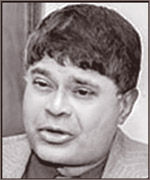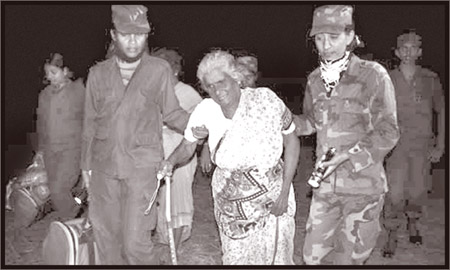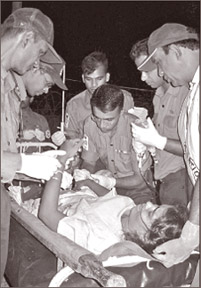The role of the Armed Forces in reconciliation
Prof. Rajiva Wijesinha, MP
 |
|
Prof.
Rajiva Wijes inha, MP |
Our Armed Forces have done a fantastic job in recent years. Not only
did they deal conclusively with one of the most accomplished terrorist
groups in the world, they also assisted the civilian victims of
terrorists with strict discipline and respect of rules of engagement,
and at the same time a very respectful and kind attitude to help those
in needí, to cite a letter sent by the head of the ICRC. However they
now find themselves on the defensive, having to face excessive charges
that even normally sensible diplomats seem to be encouraging.
I believe there are two reasons for this, one entirely our own fault,
the other much more sinister and requiring to be dealt with firmly,
though sadly our continuing incoherence of policy in this regard means
we will continue to suffer. The first reason is the presence, despite
the decency of the generality, and the excellent training that we have
provided and improved on over the years, of a few elements that behave
badly. Unfortunately we have not dealt with them at all sensibly.
Torture allegations
In the old days I used to recommend taking a leaf out of the
Anglo-Saxon model, which would charge some individuals when there was
basic evidence of wrongdoing, acquit all of them but one, and then claim
that they had fulfilled the claims of accountability - as happened for
instance with the torture allegations at Abu Ghraib. This was not, I
said, the classic Anglo-Saxon vice of hypocrisy, rather it made sense by
pointing out to the rest of the forces that what had happened was wrong,
while at the same time not being too harsh on personnel who it had to be
assumed generally did their best in difficult circumstances.
But if that seemed too tough for us, the Americans have now gone one
better, and acquitted all of those who killed Afghan civilians and cut
off their fingers. They will, I suppose, claim that the inquiry they
held proved their bona fides, while at the same time allowing Barack
Obama in an election year to escape charges that he is letting down our
brave boys on the front by punishing them from doing what God evidently
wanted them to do.
 |
|
Armed
Forces personnel helping an elderly Tamil civilian. File
photo |
That provides the best answer to what the then Attorney General would
tell me when I would urge him to prosecute those considered responsible
for the murder of five boys in Trincomalee. He did not have enough
evidence, he claimed, and they would be acquitted. It was useless my
telling him that that was not the point, he should not fear shame over a
lack of success in the classic Sri Lankan way, he should be happy that
the state had made the point that what happened was wrong. I should add
that, as I have also been constantly suggesting, we need to investigate
the White Flag case more thoroughly, and our failure to pay due
attention to what the Americans initially brought to our attention,
citing a speech in which Sarath Fonseka seemed to claim credit for what
had occurred, was a blunder which has contributed to the complete volte
face the Americans have since undergone in that regard.
LLRC report
Fortunately we seem after the LLRC report to be moving towards proper
inquiry, though there again we see what I can only describe as the sheer
carelessness of our decision makers, who waited until after American
diplomats had come to Sri Lanka to wag their fingers at us to announce
this fact.
The inquiries had begun in fact soon after the LLRC report came out,
as I found out when I asked the Army Commander a month ago what was
happening. I advised him to publicize the fact, but of course no one
ever takes my advice seriously, so we have to suffer the ignominy of
international and even national reporting that claims we instituted an
inquiry in response to American pressure.
I am immeasurably sad about this, because I see us now as going
through some of the absurdities the Jayewardene government went through
in the mid-80s, when it always yielded too little, too late, in the face
of pressure. The irony is that this government is actually in many
respects doing the right thing - which Jayewardene rarely did - but its
incapacity to communicate means that we seem to be granting under
pressure what we had decided to do anyway.
Human resources
 |
|
Attending
to an injured civilian
during the conflict. File photo |
For our record indeed has been very good with regard to the sinews of
reconciliation, much swifter resettlement than elsewhere in the world,
effective and sympathetic rehabilitation, excellent infrastructure. Much
of this has been done through the forces, including rapid and successful
demining, the refurbishment of kovils, the building of shelters and
houses. But there is more that the forces could do, which sadly we are
failing in, partly because of unwarranted pressures.
One obvious area in which the forces could contribute massively is
that of training. I have long pointed out that, while our development of
infrastructure has been impressive, the programme of reconstruction will
suffer if we do not pay equal attention to the development of human
resources. In this regard, given its capacity, the Armed Forces could
provide training in several areas in which - as I found in a survey
conducted for me by an NGO that I hope to use to expend some of my
decentralized budget in Mullaitivu this year - there are great needs.
Construction work (in particular electronics and plumbing), the repair
and maintenance of engines, basic English and IT, can all be taught by
the forces, to fulfil current demand, and to this we can add nursing and
care for the disabled.
To do all this requires a change in the profile of the forces, but
this I found is happening already. It will have to work in conjunction
with civil agencies, governmental and non-governmental, and while its
discipline and efficiency may be necessary for administrative
leadership, authority should be entrusted to others.
This can easily be done by using too those agencies in the forces
that already have a civilian framework, as for instance the Kotelawala
Defence University. It has now begun courses that are not directly
related to military training, and this can easily be expanded through
diploma and certificate courses that provide the sort of package that
will maximize employment opportunities, with some personality training
and management capacity thrown in.
Unfortunately diffidence about using the forces overmuch may stand in
the way of such initiatives. And this is exacerbated by insistence that
the forces are too obvious a presence already in the North, a cry that
is made more by people in Colombo and Jaffna than in the areas that
suffered from the destructive rule of the LTTE. I fear however that, in
adding grist to the mill of such people, through for instance the
unfortunate incident that took place with regard to a TNA meeting, which
has still not been properly investigated, some elements in the Armed
Forces are preventing the productive use of those forces in the current
phase of nation building.
Infrastructure projects
The simple fact is, the army will have to continue in situ in the
North for years to come, but unless everyone in it realizes both what it
should do, and what it should not do, it will continue to face
unnecessary criticism which will limit its effectiveness. It is there
first to ensure security, but this does not mean micro-management. It is
true that the police are still not efficient, but the answer is better
training of police, with secondment if necessary of army officers to
make up for the comparatively inadequate training our police was reduced
to during the war years (as indeed they complained to me, when I used to
upbraid them on their comparatively bad record with regard to Human
Rights). Secondly, the forces must develop productive partnerships with
civil society based on the needs of the people in each area. Assistance
to local authorities with small infrastructure projects, road building
and irrigation work, with military personnel working side by side with
locals, and training them too, should be pursued, without maintaining
distances between the forces and the people.
Another obvious way in which the Armed Forces can indicate their
actual symbiotic relationship to the people, rather than the
oppositional impression their critics are trying to propagate, is by
fast forwarding recruitment of Tamils, and Muslims too, into their
ranks. I am aware that there are efforts being made in this regard, but
people are too easily put off by problems that could be easily resolved,
and in any case there has been no concerted planning made in this
regard. For instance, though cadeting was started in the North,
initially it was confined to just a few schools in the Jaffna peninsula,
with no effort for instance made to ensure that St Patrick's (which
produced the current most senior Tamil officer in the army) was
involved. Fortunately I believe that the programme has now been extended
to the Vanni, but there should be active encouragement. Sadly, the
innovative plan of the Secretary of Defence, to recruit cadet officers
of all communities as English teachers, has been effectively killed by
the Ministry of Education after a single I believe successful
experiment.
Agri-business skills
With regard to the police, if there are insufficient candidates with
suitable qualifications in the Vanni, then efforts should be made to
provide these by alternative mechanisms, instead of waiting for the
school system to produce them in time. There are several youngsters
amongst the ex-cadres who might make good policemen, and all they need
is a quick mechanism to provide them with the necessary Ordinary Level
qualifications. Establishment of academies that train for Ordinary
Levels in appropriate subjects (the three languages, Maths, IT, and
vocational and aesthetic subjects) would not be difficult, but to get
our Ministry of Education to think outside the box is difficult. I can
only hope that the Provincial authorities, who are much more
imaginative, will move in this regard with the guidance of the Governor,
and perhaps obtain support from the Armed Forces for training in areas
where they have the expertise.
I believe then that the Armed Forces have a lot to offer, but they
must make sure that they are seen as partners filling in gaps, rather
than aliens who are in authority or competitors. Where they do act as
producers, they should do this in collaboration with the locals, as is
easily possible with model agricultural projects, where they can develop
not only cultivation capacity but also agri-business skills. We had
indeed suggested this a long time ago, through the Confidence Building
and Stabilization Measures project run by the Ministry of Disaster
Management and Human Rights when I was its Secretary, but though
photographs of what we had achieved were used when plans were being
drawn up for the Welfare Villagers, the concept was then forgotten, and
my excellent staff, Bindu Urugodawatte and Sujiva Jayasinghe, who had
achieved so much with so little, were no longer used. Even now, given
the excellent cooperation they had with the forces - for instance in the
kovil cleaning project they implemented before Thai Pongal in 2010 -
they would be admirable facilitators for Civil-Military cooperation in
any agricultural initiative planned in the area, for instance in Manik
Farm, where it would be a pity to let the cleared land go back to
jungle, if the owners are willing for good use to be made of it for a
while longer.
We must move then with confidence but also with sympathy, and with
understanding that the main purpose of any action now must be ensuring
the prosperity as well as the peace of the civilians who suffered so
much for so long.
There will be many trying to create diffidence, but while that should
be resisted, we need too to make sure that there are no aberrations on
our part, and that any that occur are dealt with swiftly and firmly. The
message after all must be as clear and constructive as the substance. |



